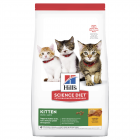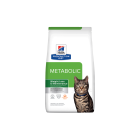
Feeding the Kitten
The mother cat, called a queen, usually allows her kittens to suckle from her for the first seven to eight weeks of that kittens life. It is around this time that the mother gradually decreases the amount of time she lets the kitten suckle, so that by the time the kitten is seven to eight weeks old, it is only getting about 10-20% of its intake from the mother cat.
Since the kitten is so dependent on the mother cat for the first several weeks, you need to be sure to find an appropriate replacement. Remember, a kitten needs two to three times more calories than an adult cat. There are commercially available milk replacers that are suitable if the mother cat is absent. You should also supplement the kitten’s diet with small servings of canned food or dry commercial food once the kitten is three to four weeks old. Kittens also have a tendency to play with their food instead of eating it, so you might need to clean your kitten after it is done eating.
Watch for Weight Gain
The amount of weight the kitten gains is a good sign of how well it is eating. During the first few weeks, you should notice the kitten’s weight doubling or even tripling. Weighing your kitten before and after every feeding is a great way to keep track of how well the kitten is doing and any consistent weight loss should be investigated by a veterinarian. The kitten should continue to gradually gain weight until it reaches its adult weight. This will happen at around nine to twelve months of age.
Determining How Much to Feed
When the kitten is weaned, you should feed it about four times per day until it reaches three months of age. If the kitten is gaining weight and growing normally, you can reduce this to three times per day. Once the kitten reaches six months old, you should only feed it twice per day.
How to Feed Your Kitten
You should never leave food out for your kitten. When food is left out, the nutrients are lost because the antioxidants, fatty acids, and vitamins tend to oxidize. In addition, you should be sure to feed your kitten a variety of foods of different shapes and textures. This will help keep your kitten from growing into a picky adult.
When you plan your kitten’s meals, you should ensure it's diet contains at least 1/3 protein. Furthermore, a homemade raw diet and canned foods are a good addition because they add moisture to the kitten’s diet, which can help prevent bladder and kidney problems. Therefore, the best food you can feed your kitten, and your adult cat, is canned food or a raw, homemade diet. If you decide to feed your kitten or cat raw, be sure to do your research and ensure your pet is eating a fully balanced diet including all of the necessary vitamins and minerals for optimal health.





